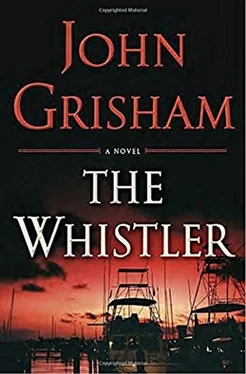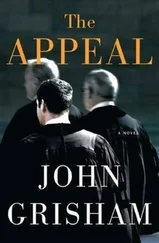“I’ve never had a bad wreck. Guess it takes time to get back in the saddle.”
“A long time.”
“You look great, Lacy,” he said for the third time. “I like your hair. Have you thought about keeping it short?”
“No, not for a second,” she said with a laugh. A month after leaving the hospital, her scalp was now covered with a thin layer of fine hair that seemed a bit darker than what they’d shaved, but she wasn’t worried. At least it was growing. She had retired the scarves and hats and didn’t care if anyone stared.
He wanted to know the latest developments in her investigation of the crooked judge and the casino, and Lacy filled in some of the backstory. Gunther could keep a secret and obviously had no one to tell back in Atlanta, but Lacy could not completely ignore the rules of confidentiality. She admitted they had hit a wall when the FBI declined to get involved.
This gave Gunther a soapbox, one he didn’t yield until they arrived at her apartment. He railed against the federal government, its bloated size and countless agencies and useless bureaucrats and senseless policies. He mentioned his own run-ins with the EPA, EEOC, IRS, even the Department of Justice, though he didn’t give details of any scrape with the law and Lacy didn’t ask. How could the FBI, with a million agents and a billion dollars, decline to pursue such blatant corruption? A man has been killed, yet the “Fibbies” refused to investigate. He was flabbergasted, even angry.
Inside, he tossed his bag and briefcase in the guest room and Lacy offered tea or water. Gunther asked for a diet soda. He had been in recovery for almost ten years and was well beyond the fragility of early sobriety. His drinking days had been the lore of family legend before turning dark and frightening. At their insistence, he had rehabbed twice and without success. A DUI, a divorce, and a bankruptcy all hit at once, and at the age of thirty-two Gunther gave up booze and drugs and surrendered to a higher power. He had been radically sober for years, to the point of volunteering in a rehab clinic for teenagers. When asked, he spoke freely of his addictions.
Gunther, as she well knew, spoke freely of anything and everything. To keep the conversation away from more sensitive matters, she told the story of her meeting with Wilton Mace at a downtown hotel. This led to a lengthy narrative about the murders of Son Razko and Eileen Mace, and Junior’s trials and so on. That was not her case. Its record was public. Confidentiality was not important.
Gunther, like most white people, thought the idea of an innocent man on death row was absurd. Surely Junior was guilty of something or he wouldn’t be there. This led to a long and often heated and frustrating conversation about the criminal justice system. The law was Lacy’s life and she understood its flaws. Gunther lived and breathed real estate and making money and had little interest in anything else. He admitted he seldom read a newspaper, unless he glanced at the business section. He hadn’t heard a word about two recent, extremely high-profile DNA exonerations in Georgia, one involving a man who’d served twenty-nine years for a rape and murder committed by someone else. In Gunther’s opinion, the prisons were full because of rampant crime.
Speaking of business, he had a few phone calls to make, finally. Lacy was exhausted and needed a break herself. She showed him to a small terrace off the kitchen. A wrought-iron table was the perfect spot for him to set up shop.
–
For dinner, they chose a Thai place near the FSU campus. After they settled into their seats, Gunther suddenly reached for a pocket and whipped out a cell phone. “Gotta do this e-mail, Sis,” he said, already tapping away.
She watched with a frown, and when he finished she said, “Here’s the deal. All phones on the table, on mute, and the first one that vibrates gets the check.”
“I was going to treat anyway.”
“I’m sure you will.” From her purse she removed her iPhone and the new BlackBerry issued by BJC. He matched her two with two of his own. “What’s that?” he asked, pointing to the BlackBerry.
“State issue. Its predecessor was the one stolen from the car.”
“And no trace?”
“Nothing. Our tech guys said there’s no way to hack in. I guess we’re safe.” She reached for a front pocket of her slacks and said, “Oh, almost forgot.” She pulled out the prepaid burner Myers had given her.
“You have three phones?” Gunther asked.
“This doesn’t really count,” she said, placing the burner in a neat row with the others. “It’s what Myers uses. I think he goes through several each month.”
“Smart guy. When’s the last time you talked to him?”
“A few weeks back. The day he gave me this phone.”
An exotic Asian girl appeared to take their orders. Gunther ordered tea and encouraged Lacy to order a glass of wine. This was a ritual they had gone through a hundred times. She would do nothing to tempt him, but he took pride in being beyond temptation. Besides, he had never been a wine drinker. Too mild, too civilized. Lacy asked for a glass of Chablis. They decided on a plate of crispy spring rolls to start with. When the drinks arrived, and they were comparing their latest conversations with their mother, Ann, one of the phones made a soft noise. Of the impressive collection in the center of the table, it was the least expected.
Myers was checking in. Lacy sighed, hesitated, then said, “I guess I’d better take this.”
“Of course. And you can take the check too.”
She slowly opened the phone, glancing around as she did so, and quietly said, “This better be good.”
A strange voice replied, “I’m trying to find Lacy Stoltz.”
She hesitated again, certain that it was not Greg Myers. “I’m Lacy. Who is this?”
“We’ve never met but we both know Greg. I’m the intermediary, the middleman, the guy who handles the mole. We need to talk.”
This was so wrong that Lacy’s lungs froze and she felt faint. Her face must have registered horror because Gunther reached over and gently touched her arm. “Where’s Greg?” she asked. Gunther’s eyes narrowed with concern.
“I don’t know. That’s what we need to talk about. I’m in town, not far from you. How soon can we meet?”
“I’m having dinner. I-”
“Two hours then. Let’s say straight-up ten o’clock. Between the Capitol and the Old Capitol Building there is a courtyard. I’ll meet you at the front steps there at ten.”
“What is the danger level right now, if I might ask?”
“Right now, between the two of us, I’d say there’s no immediate danger.”
“Okay, but I’m bringing my brother, and he likes to play with guns. Should he bring one just in case?”
“No, Lacy, we are on the same side.”
“Has something happened to Greg?”
“We’ll talk about it later.”
“I’ve lost my appetite. I’ll be there in half an hour.”
–
The Capitol Grounds were well lit and a few other pedestrians were milling about. It was, after all, Saturday night and all state workers were enjoying the weekend. The lone figure near the steps of the Old Capitol was dressed in shorts, sneakers, and a baseball cap, and would not have attracted attention anywhere in town. He took one last drag of his cigarette, stepped on the butt, and walked to them. “You must be Lacy,” he said with an outstretched hand.
“I am. This is my brother, Gunther.”
“My name’s Cooley,” he said as everyone quickly shook hands. He nodded and said, “Let’s walk.” They strolled without purpose across the courtyard in the direction of the House Office Building. Cooley said, “Don’t know how much you know about me, probably very little.”
Читать дальше












